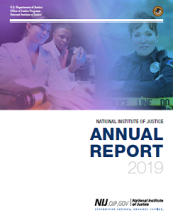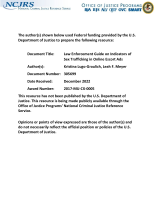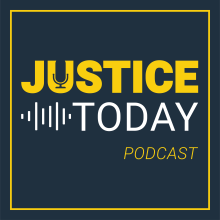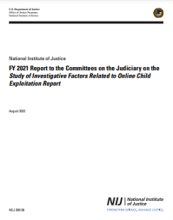Human trafficking
NIJ FY23 Research and Evaluation on Trafficking in Persons
Gender-Based Violence and the Latinx Community
See the YouTube Terms of Service and Google Privacy Policy
National Institute of Justice Fiscal Year 2019 Annual Report
Law Enforcement Guide on Indicators of Sex Trafficking in Online Escort Ads
Understanding, Preventing, and Responding to Human Trafficking
Understanding, Preventing, and Responding to Human Trafficking
Embracing Tribal Culture to Build Research Partnerships
Human Trafficking
NIJ funds research on human trafficking and evaluation of promising practices. The overall emphasis for NIJ’s research lies on:
- Strengthening the science of measuring the prevalence of human trafficking
- Preventing trafficking
- Improving the identification, investigation, and prosecution of traffickers
- Identifying best practices for identifying and providing services to victims.
While NIJ focuses on human trafficking as it occurs in the United States, it draws on...
Identifying online risk markers of hard-to-observe crimes through semi-inductive triangulation: The case of human trafficking in the United States
Explaining the Use of Traditional Law Enforcement Responses to Human Trafficking Concerns in Illicit Massage Businesses
Recommendations for Practitioners Evaluation of the Enhanced Collaborative Model Task Forces to Combat Human Trafficking
Collaboration and Challenges in Antitrafficking Task Forces: Lessons Learned from the Enhanced Collaborative Model Task Forces to Combat Human Trafficking
Findings from an Evaluation of the Enhanced Collaborative Model Task Forces to Combat Human Trafficking
Improving Outcomes for Child Sex Trafficking Victims, Phase 2: A Rigorous Outcome Evaluation of Love146’s Long-Term Services (LTS) Program
Replication Validation of a Human Trafficking Screening Tool for Law Enforcement and Estimation of Prevalence
Multi-Site Evaluation of the Enhanced Collaborative Model to Combat Human Trafficking
FY 2021 Report to the Committees on the Judiciary on the Study of Investigative Factors Related to Online Child Exploitation Report
Human Trafficking Project
Evaluability Assessment of a Metropolitan Network Service Delivery Model to Connect Trafficked Persons with a Full Range of Victim Services, Final Research Report
Evaluation of Technology-based Advocacy Services (ETA): Technical Report, Executive Summary
In Their Own Words: The Impact of Indirect Trauma Exposure on Judges Presiding Over Cases Involving Minors Involved in Sex Trafficking
Trafficking in Persons: Summary of Focus Group Discussion
The Hidden Costs of Reentry: Understanding the Barriers to Removing a Criminal Record
NIJ hosted a webinar to discuss under-researched aspects of reentry: expungement of criminal records and the impact of those records. This webinar includes a presentation of ongoing research projects examining the impact of legal aid for expungement and past research projects studying the accuracy and permanency of criminal records and the prevalence of collateral consequences of conviction. A Q&A session will conclude this webinar.
See the YouTube Terms of Service and Google Privacy Policy









